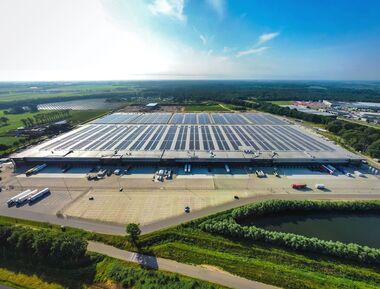Worldwide switch to green power
Global supply chain and e-commerce service provider Arvato has been sourcing its electricity entirely from renewable sources since the beginning of 2023.

The switch to green power has already saved 20,000 tons of CO2 compared to 2018 – the baseline year for the company's climate targets. In addition, Arvato is also increasingly expanding its own power generation using photovoltaic systems. Systems are already in operation at 18 locations worldwide. New systems are currently being installed in Düren and Dorsten, as well as an expansion in Poland. Feasibility studies are also being carried out at numerous other locations.
"By switching globally to green power, we have achieved an important goal in our sustainability strategy and thus also pay into Bertelsmann's overarching climate strategy," says Melanie Engler, Senior Expert Sustainability at Arvato. "At the same time, the switch to green electricity was easier to implement in some countries than in others." In Germany, for example, all sites have been using 100 percent green power since the beginning of 2021. All that was needed was to change the tariff with the energy provider. In countries such as Turkey, China or Poland, however, such a simple change in tariff is often not possible. Here, there is the possibility of acquiring so-called 'Renewable Energy Certificates' (RECs), which document that the purchased electricity comes from renewable energy sources. Each certificate serves as proof that one megawatt hour (MWh) of renewable energy was generated and fed into the grid. The certificates must be sourced as locally as possible, i.e. in the same energy market or in neighboring countries, and they must meet defined qualitative standards – these are key requirements on the part of Arvato and part of Bertelsmann's strategy. The aim is to increase local demand and promote the expansion of renewable energy projects.
"As a result of the 100 percent switch to green power, we only have little leverage for further measures in the area of Scope 2 emissions, i.e. the indirect emissions from purchased energy," explains Melanie Engler. "That's why we're now looking at further measures, focusing among other things on emissions caused by heat generation. In this way, we are setting the course for our second climate goal of halving site emissions by 2030 compared to 2018." In order for Arvato to make its contribution to the heat transition, the aim is to save heat energy and use climate-neutral heat pumps for generation.
Another focus is on growth that is as climate-neutral as possible, which entails new requirements for distribution centers. These have already been summarized in Arvato's own 'Global Sustainable Building Policy', which lists global standards for the nature of both owned and leased sites. Melanie Engler: "Furthermore, we also see additional potential in employee-related emissions. That's why we are working consistently to expand the charging infrastructure for electric vehicles at our sites and improve connections to local public transport. We also promote local job tickets, for example, and have introduced a ride-sharing app in France that could also be rolled out in other countries."